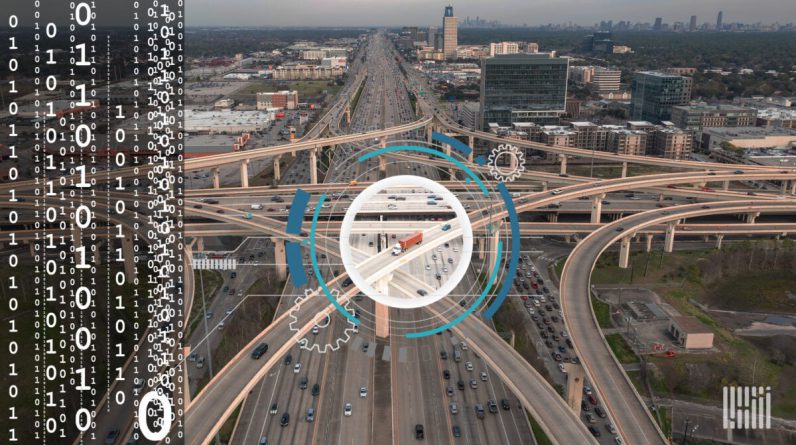
As the logistics industry prepares for a more positive 2025, the potential for automation — utilizing machine learning and AI — to impact operations has never been more significant.
From optimizing electric vehicle fleets to mitigating fraud and automating nonrevenue tasks, automation is positioned to address some of the industry’s most pressing challenges. Here’s a look at the key areas where automation could drive change in logistics this year.
The complexity of global supply chains demands that logistics companies possess complete, real-time visibility into their operations. AI has the potential to transform this aspect of logistics, particularly in managing supplier relationships.
In a recent McKinsey report, 55% of supply chain leaders surveyed said they were planning on investing more into AI-based tools to improve end-to-end supply chain visibility. It described capabilities for this technology to analyze structured and unstructured data from various tiers of suppliers to get a real-time risk analysis.
Semantic Visions, an analytics firm, is building a multitier mapping tool that uses AI and natural language processing to uncover complex supplier relationships. Using the company’s technology, companies can automate compliance tasks, such as monitoring sanctions and environment, social and governance performance, across their supplier networks. This also helps organizations stay ahead of evolving regulatory demands.
COO Julius Rusnak explained to FreightWaves how the technology empowers customers to mitigate risk, find new opportunities and build greater resilience.
“AI is an enabler, unlocking new possibilities that were previously unimaginable. … These systems don’t just optimize existing workflows, they inspire leaders to rethink their current strategies,” he said in an interview.
Mitigating fraud
Fraud has been a persistent issue in logistics, but as fraudsters’ tactics evolve, so too do the tools used to combat them. AI is proving to be an ally in identifying fraudulent activity across the supply chain.
A recent interview with an Uber Freight executive highlighted how AI-powered systems can monitor every aspect of operations in real time, analyzing data to detect anomalies and suspicious patterns that might go unnoticed by human teams.
“We use predictive analytics and AI throughout our onboarding process. We are looking at various data points and correlations to raise flags for human intelligence to review,” said Chris McLoughlin, senior director of operation for risk and compliance at Uber Freight.
“We use it throughout an entity’s journey on our platform and watch how it evolves over time. The longer someone is on our platform, we will make adjustments to how we are evaluating that entity’s performance. … We’re not just focused on carriers. We do look at shippers on our platform and those offering freight in our ecosystem. If a customer is constantly looking for rates but never putting any freight into our ecosystem. … it will trigger our compliance team to make a phone call.”
AI tools are also enabling industrywide collaboration, allowing data sharing among logistics providers to identify emerging fraud trends and develop proactive responses. As fraudsters increasingly turn to AI and other technologies to carry out sophisticated schemes, logistics companies will need to leverage technology to stay ahead in the battle against fraud.
One innovative example is GenLogs, a startup using computer vision and predictive analytics to track and identify potential fraud in real time. By using methodologies similar to those employed in counterterrorism operations, the company’s platform identifies criminal activity in the logistics sector, helping dismantle fraud rings and protect businesses from financial losses.
“Using link analysis, based on what we’re observing on the roads, we can start to build out patterns and networks. Our goal is not to just disrupt the criminal networks. Our goal is to dismantle them. We want to have enough evidence to take down whole networks,” CEO and co-founder Ryan Joyce said in an interview.
In 2025, predictive analytics fueled by AI will become the norm, offering logistics companies the tools to prevent theft and other fraudulent activities before they occur.
Making electric vehicles work
The transition to electric trucks is seen as a critical step in reducing the environmental footprint of the transportation sector. However, the adoption of electric vehicle (EV) fleets presents challenges.
“Running an electric vehicle fleet is an incredibly complex problem,” Sami Khan, co-founder and CEO of all-electric fleet Nevoya, told FreightWaves.
“Electric charging is one element of it but because the vehicles themselves are so much more expensive, we have a much higher ratio of trailers to trucks because we want our trucks moving all of the time. But planning the use of those assets requires technology to solve. How do we optimize those trailers within our network? When is the best time to drop a trailer at a customer? Where and when do we charge and for how long?”
Khan explained that to make the EV commercial truck fleet model work, efficiency is key and AI-driven technology helps the company schedule routes, plan charging stops and select lanes that serve their electric trucks from a cost standpoint. Rather than integrating EVs into an existing diesel-based business model, Khan believes it is more effective to build a new company from the ground up that is designed around the requirements.
As AI continuously analyzes these unique variables, automation helps maximize fleet utilization, ensuring that trucks stay on the road longer and contribute to higher revenue generation to make the investment in the electric assets make sense.
According to Khan, this level of coordination is simply not feasible without this technology, but it is essential to turn electric trucks into a viable business model. He also sees tailwinds like government incentives and decreasing vehicle costs over time further improving the economics of EV fleets.
Automating nonrevenue tasks to focus on data-driven decision making
Nevoya is also using automation to help with tasks not directly related to driving revenue.
“We are seeing a lot of opportunities to innovate and bring value outside of electric-specific work. For example, on a daily basis we are getting hundreds of emails from our brokers or shippers asking where the truck is, when is it arriving? What the trailer number is or which driver is picking up. These are the exact use cases that AI is perfect for solving.”
Logistics and transportation providers often deal with a significant amount of non-revenue-generating tasks, including retrieving proof of delivery or verifying rates with factoring companies.
These tasks can be time-consuming and detract from the core business of closing deals and servicing clients. The potential to automate these processes would allow them to focus on higher-value activities.
Kevin Nolan, the founder of Nolan Transportation Group and logistics investment firm Sope Creek Capital, believes that automation technology will be transformative for nonrevenue tasks that have long been a drain on brokers’ time and resources specifically.
“AI isn’t going to win business, but it will make humans so much more efficient in what they are working on,” Nolan told FreightWaves. “The amount of inbound phone calls brokers get is high, and we can only answer so many calls and 25 to 30% of calls often lead to wasted, nonrevenue actions.”
This is why the founder recently invested in AI-powered logistics communication platform CloneOps.ai, which helps logistics companies automate those tasks with virtual agents.
This level of responsiveness and potential for personalization could revolutionize the broker-client relationship, setting top brokers apart from their competitors, Nolan explained.
Forward-thinking logistics providers are even starting to develop proprietary automation tools and AI-driven analytics that leverage data across multiple clients. This data-driven approach allows them to identify best practices and provide valuable insights to improve efficiency for clients – a critical differentiator in an increasingly competitive landscape.
Logistics providers that do not have the capabilities to build proprietary automation tools themselves are reaching out to outsourcing providers that are betting on automation technology.
“There are many levels in which providing logistics services is going to be assisted by technology, and we want to be at the forefront of that, given that we already have the human expertise. We will be developing proprietary tools to make providers more productive and relieve them of some of their more repetitive, basic functions,” said Chris Fields, vice president of sales at Zelh Logistics, an outsourcing and outstaffing provider for logistics companies.
“We want to present providers with staff that are already competent in areas they might not already have people for. There will be employees in every company, in-house, that know about AI, but they are not going to necessarily want to develop training programs and create custom tools. It will be on companies like us to make sure that staff is brought in that is competent enough to use those tools from the get-go, as opposed to putting that responsibility on the client,” he explained.
While logistics providers can lean on outsourcing companies like Zelh to offer a strong skill set of both logistics and technical knowledge, technology expert Don Everhart, head of partnerships and strategy at Transflo, believes providers should still focus on the long-term strategies of employee technical skill development.
“In order to unlock the potential [of AI], the workforce will need to find a way to leverage it as a force multiplier, versus viewing it as something that will replace them. Skill growth in the arena of prompt engineering, how to tweak or think about model inputs and outputs, and helping others learn to utilize it will be important.”
And for the AI-weary, “Embrace it,” Everhart says. “I’ve seen some academics embrace it fully, while others are still trying to ban it. The reality is these are the tools people will use in their day-to-day jobs in the future.”
EXCLUSIVE: Shippeo lands $30M to further its North American and Asia-Pacific ambitions
Former C.H. Robinson exec joins Armada Sunset to lead strategic growth
Omnitracs, Platform Science IP lawsuit may have reached the end of the road








